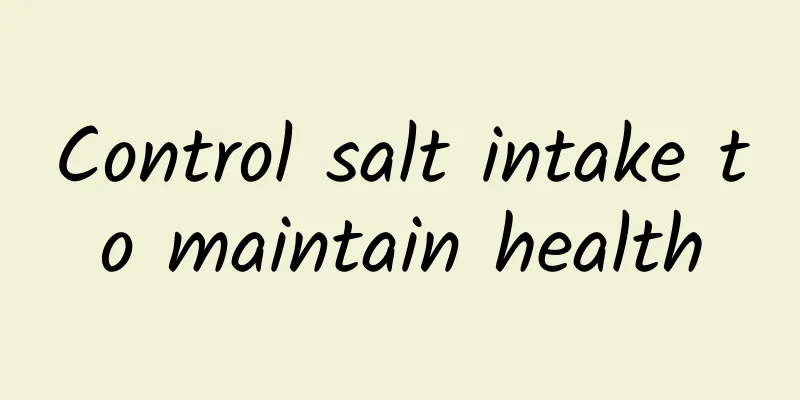Control salt intake to maintain health

|
Now, many of us have realized that long-term high-salt diet is one of the important causes of high blood pressure, heart disease, osteoporosis, obesity and other diseases, and reducing sodium intake can better prevent them. Let's talk about some tips on how to keep a light taste while eating less high-salt (sodium) foods! 1. Put 5% to 10% less when cooking Reducing cooking salt by 5% to 10% usually does not significantly affect the taste of dishes, and helps people gradually adapt to and develop a light and low-salt diet. Based on the daily personal salt intake, you can set a reasonable salt reduction goal, gradually reduce the intake step by step, and eventually reach the goal of no more than 5 grams of salt per day. 2. Pay attention to the "invisible salt" in food The salt content in food is not proportional to the saltiness, and you cannot judge whether the salt intake is excessive just by tasting it. Although many processed foods do not taste salty, salt is added during the processing, such as condiments such as ketchup and jam, instant noodles, frozen foods, noodles, bread, biscuits and other convenience foods, and snacks such as spiced melon seeds, preserved plums, and French fries. It is recommended to read the nutrition label carefully when buying pre-packaged foods. The sodium (Na) content on the nutrition label indicates the salt content. Try to choose foods with low sodium content. 3. Diversified cooking methods It is recommended to try more cooking methods such as steaming, boiling, and blanching. The best time to add salt is before taking the food out of the pot, so that the salt remains on the surface of the food, which can retain the saltiness and avoid adding too much salt. Leafy vegetables can be added with salt just before turning off the heat, and root vegetables such as potatoes and lentils, which have a dense texture and are not easy to absorb flavor, can be salted when they are 80% to 90% cooked. 4. Use natural ingredients to enhance the flavor When cooking, you can choose ingredients that have natural umami flavors, such as celery, onions, tomatoes, and coriander. In addition, you can also use ingredients such as green onions, ginger, garlic, chili peppers, peppercorns, and curry to enhance the flavor, and use sour substances such as lemon and vinegar to enhance the salty taste, thereby reducing the amount of salt used. 5. Use more salt control tools Only by quantifying salt can you know your salt intake. You can choose a salt-limiting spoon as a quantification tool. According to the specifications of the salt spoon, you can know the amount of salt to add when cooking every day. Note that it is 1 flat spoon, and it cannot be too sharp. In addition, you can choose reduced-salt soy sauce to control salt intake to a certain extent. It should be noted that patients with kidney disease should consult a doctor and should not blindly choose low-sodium salt. |
>>: How to maximize the efficacy of targeted tumor therapy? Here are 5 key points to know!
Recommend
Leucorrhea is like pus
Discharge is a weather chart of the health of a w...
What are the effective breast enhancement methods?
I believe that all women who love beauty are very...
How to relieve stomach pain during breastfeeding
Breastfeeding mothers have it no easier than when...
What causes an increased heart rate during early pregnancy?
Accelerated heartbeat in early pregnancy is a par...
Tips for relieving early pregnancy reactions
In fact, in the early stages of pregnancy (the fi...
How do you know if your uterus is prolapsed?
Everyone knows that the conception of a child tak...
Eight months pregnant, frequent urination
The eighth month of pregnancy is in the late stag...
Expert answers: Common questions and misunderstandings about scoliosis
The long summer vacation has come to an end. Duri...
The dermatology department has received many cases of children with crab allergies! In autumn, crabs are more likely to be eaten with these precautions to be safer
With the start of the National Day holiday, peopl...
Women should be alert if they gain weight suddenly
We know that if a person suddenly loses a lot of ...
[World Asthma Day] Taking aspirin to induce asthma is almost fatal? ! Be careful!
May 7th this year is the 26th World Asthma Day, a...
How to travel to Xishuangbanna alone and make the most of it? Things to pay attention to when traveling to Xishuangbanna
The Qingming Festival is coming soon. Although th...
Why does my waist hurt ten days after abortion?
Nowadays, many women choose to have an abortion t...
How is paddle cell mastitis treated?
Women are no strangers to the disease of mastitis...
Walking is effective for weight loss, but you must know these precautions
Fast walking is a very good form of exercise. Som...









